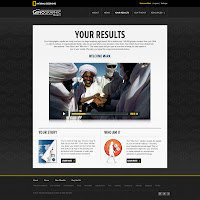Roberta J. Estes has graciously allowed me to re-post her interview with Bennett Greenspan, President of Family Tree DNA, regarding his company's partnership with the Genographic Project and their new Geno 2.0 chip.
Roberta has been a professional scientist and business owner for over twenty-five year, and is highly respected in genetic genealogy world. In 2005, with an interest and expertise in genetics for genealogy, she formed DNAeXplain,which provides individual analysis of DNA results and genealogical assistance. In 2009 she teamed with Family Tree DNA to jointly offer Personalized DNA Reports for customers. She manages over twenty DNA projects including the Cumberland Gap Yline DNA and mitochondrial DNA projects and is the founder of the Lost Colony DNA research projects. She also co-administers several Native American and African DNA projects and is an adviser for the Melungeon project.
The following is her interview posted on July 26, 2012 at DNAeXplained - Genetic Genealogy.
Bennett Greenspan was gracious enough to call me with the answers to several questions and responses to comments and speculation on blogs and lists today. He wants to thank everyone for their interest and personal support for the ongoing research and the new product. I am putting these in a question and answer format.
Q: Can I purchase the Geno 2.0 kit elsewhere?
A: The Geno 2.0 product can only be purchased through the National Geographic Society. This product cannot be ordered from Family Tree DNA..
Q: Will there be a way to move my Geno 2.0 results to the Family Tree DNA database?
A: As with the original National Geographic product, we plan to have a link on the Geno 2.0 personal page to allow people to upload their results. With the Geno 2.0 deep SNP results, they will be able to enter their Family Tree DNA account number, if they have an existing account at Family Tree DNA, and their deep SNP results will be included with their other tests results on their personal page.
Q: Does Family Tree DNA plan to offer a test that will be more extensive then the new Genographic test for the Y chromosome?
A: No. The most extensive test for obtaining YDNA SNP data is available on the Geno 2.0 chip and Family Tree DNA has no plans to compete with its partner. STR results will not be supplied by Geno 2.0 and all regular genealogical marker tests should be ordered through Family Tree DNA. These two tests go hand in hand.
By way of example, in haplogroup R-M222 – the new Geno chip includes discoveries of at least three unique SNP’s downstream of R-M222.
These 10,000 new SNPs will provide, for almost everyone, one or two additional clades (subhaplogroups) down the tree from where they are located today. For some people, these will reach into a genealogical timeframe, connecting their SNPs and their STR data. The STR tests will then be used to further augment the Geno 2.0 SNP tests for genealogical comparisons within families.
Q: When will the new Y tree be available?
A: FTDNA is vetting the Y tree in conjunction with the Genographic Project and prior to the release of these data. This won’t occur until they will have had enough samples to fully vet the 12,000 tree SNPs, confirming the positions on the tree and that all SNP’s are working correctly.
Q: What is the difference between the full mitochondrial sequence (FMS) test and the Geno 2.0 test for mitochondria?
A: Chips can only tell you what is programmed on them. The Geno 2.0 test is not as complete as the FMS. Geno 2.0 includes all mtdna SNPs approved for research purposes at Family Tree DNA plus all known mutations found in Genbank. The Geno 2.0 chip includes a total of about 3,100 locations, more than any other product using this same technology.
This test is very complete for European-centric haplogroups, such as H. However the test is anthropological in nature, not genealogical. This means that while you will receive your haplogroup assignment to the same level as a full sequence test, you will not receive other genealogical information that could be critically important to your research. (Private SNP’s that are unknown will not be ‘discovered’ via chip testing).
If you want your anthropological information, meaning haplogroup information only, then the Geno 2.0 kit is the way to go.
Geno 2.0 has 50% more mtDNA SNP’s than the next best chip technology for mtDNA. The only thing better is the full sequence test. The full sequence test is the only test that can be universally used for scientific research as well.
Q: There seems to be some confusion surrounding what products to order for what purposes.
Geno 2.0
Product Purchase?
Y DNA – 12,000 SNPS – Deep Ancestry – Haplogroup identification Yes
Mitochondrial DNA – Anthropology – Deep Ancestry – Haplogroup
Identification Yes
Ethnicity – Worldwide Populations – Ancestral Informative Markers –
Deep Ancestry – 137,000 total SNP locations – covers many
SNPS not in Family Finder Yes
FTDNA Products
Product Purchase?
Y- DNA Regular STR tests, 12, 25, 37, 67 and 111 markers Yes
Mitochondrial DNA tests for genealogical comparisons Yes
Family Finder –for genealogical matching – cousin matching
provided from Family Tree DNA data base Yes
Y DNA deep clade test Order Geno 2.0 unless
time is of the essence
Y DNA WTY – after running Geno 2.0 on kit, discuss with Family Tree DNA
Case by case
Thank you Roberta for being so kind to allow me to post your interview.
To order the new Genographic test click on Geno 2.0
Emily, 26 Jul 2012




